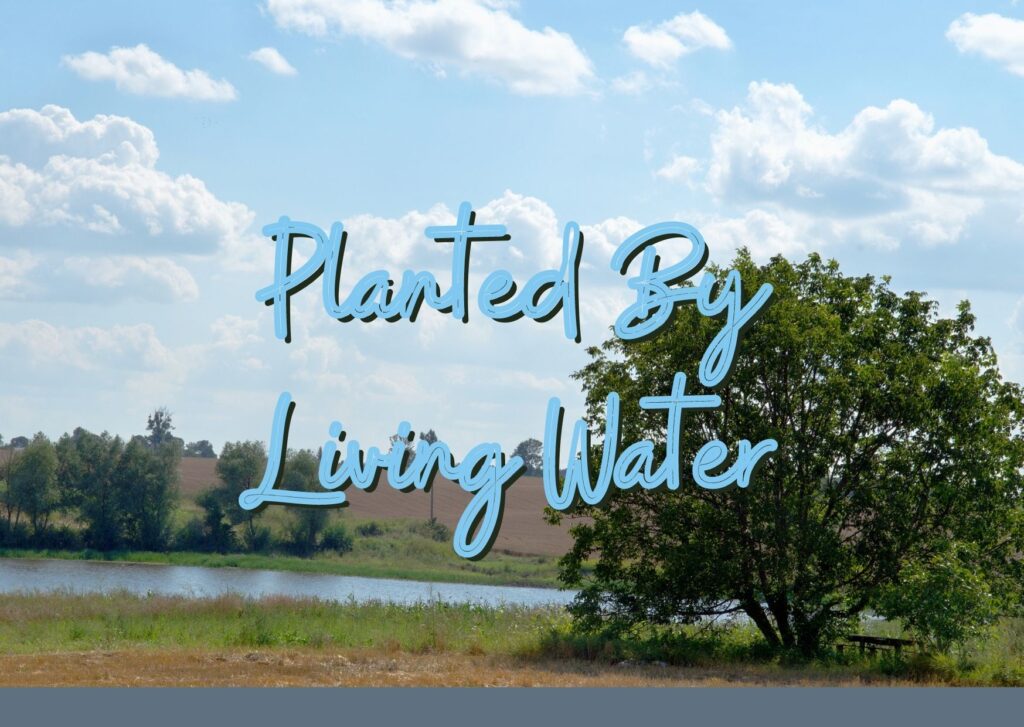Planted By Living Water

Planted by living water.
Last month in the Tri-Cities, there was a dazzling light show. It was caused by the fire that was contained in the Columbia delta by Richland. It was stunning to see the red-orange glow late into the night, and we prayed for the safety of the first responders and anyone caught up in the inferno. Theo still believes it was some volcano that erupted lava in the area regardless of how many times I tell him it was only fire. Thankfully the fire only consumed brush and some groves of Russian Olive trees, and the river contained the more dangerous elements of fire to some islands dotted throughout the water. Based on the intensity of the flames, I would have imagined that the fire would have consumed all vegetation on the island, but it only affected the smaller brush. The proximity to the water is responsible for the durability of the other plants and trees on the islands. It reminds me of this passage from the writings of the prophet Jeremiah.
Jeremiah 17:7-13
“Blessed is the man who trusts in the LORD,
whose trust is the LORD.
8 He is like a tree planted by water,
that sends out its roots by the stream,
and does not fear when heat comes,
for its leaves remain green,
and is not anxious in the year of drought,
for it does not cease to bear fruit.”
9 The heart is deceitful above all things,
and desperately sick;
who can understand it?
10 “I the LORD search the heart
and test the mind,
to give every man according to his ways,
according to the fruit of his deeds.”
11 Like the partridge that gathers a brood that she did not hatch,
so is he who gets riches but not by justice;
in the midst of his days they will leave him,
and at his end he will be a fool.
12 A glorious throne set on high from the beginning
is the place of our sanctuary.
13 O LORD, the hope of Israel,
all who forsake you shall be put to shame;
those who turn away from you shall be written in the earth,
for they have forsaken the LORD, the fountain of living water.
The person described in this passage is the person I want to be. I want to be known as a person that trusts in God. Observe how Jeremiah describes this person; they stay alive, vibrant, and do not become anxious even in difficult times. This passage comes from the greater narrative regarding the narrative of Judah’s failings. This interior passage contrasts the behavior of Judah, choosing to trust human abilities, and ultimately trusting God. If we rely on only our skills or the people around us, we will fail, and they will let us down. There is only one way to acquire our outcome, and that is by trusting in God.
People have remarked how impressed they are that our family can stay positive without receiving our household goods. I suppose it is remarkable, but I don’t see this as an opportunity to live begrudgingly but to realize that this is an opportunity to trust in God. Even if we never see our “stuff” again, God has taken care of us. Not only are we blessed spiritually speaking, but the worldwide church (even people we have never met) have blessed us financially and have showered us with so many things; it is hard not to be anything but grateful. And so, even in a difficult time, my attitude is not resentful or bothered but thankful.
Having an attitude like this is what it means to be planted by a stream, placing our trust in God. We know that whatever happens, God is still sitting on His throne. He is the fountain of living water; in Him, we will trust.
Moving to the Tri-Cities

Moving to the Tri-Cities-
Let’s talk about moving… it is not fun. Exciting? Sure. Intimidating? I’ll agree to that. Exhausting? Absolutely!
There is just so much that has to be done in order to replicate the world that we once knew. Maybe that is the problem. We prefer to have things to be like they once were. We love these little pieces of our lives that give us comfort because it makes us feel as if we are in control. We do this in little ways, moving from New Mexico, perhaps I will try to find a “piece of home” here in Washington; maybe it is a restaurant or a particular view, perhaps it is just a picture I look at fondly and remember what used to be.
Back to the problem. Things that once were can never be what will be. That is the condition of moving. No matter how much we try, we can’t replicate it, so instead, we should embrace the new. We should embrace the new experiences and see what is right before us; living in the past is comfortable, but it is still the past.
In this regard, I think of Lot and his wife. In Genesis 12, Abram takes his nephew Lot to a new place… this is Abram’s first failure, “The LORD had said to Abram, “Go from your country, your people and your father’s household to the land I will show you.” (Genesis 12:1). Abram wanted to keep a little bit of his former life with him; God explicitly instructed him to leave his father’s household behind… yet Abram takes Lot. This problem multiplies in Lot and Abram’s life. Lot moves to be among the cities in Genesis 13; this would have been familiar to Lot, the land of Ur would have been more accommodating for city life… and Lot missed it.
In the destruction of Sodom and Gomorrah, Lot is given a test to see if he has learned his lesson of wishing things would stay the same… in other words… would he trust God? “As soon as they had brought them out, one of them said, “Flee for your lives! Don’t look back, and don’t stop anywhere in the plain! Flee to the mountains or you will be swept away! ” (Genesis 19:17). Don’t look back, and don’t stop. We see how this plays out in the tragic tale of Lot’s wife. This passage is not a condemnation on reflecting or thinking about the past; however, it is a cautionary passage on trusting and relying on God.
As I settle into my new place here in the Tri-cities, I should reflect on this and realize that God has brought me here. And although returning back to the comfort of the known would be easier and safer, it is not where God has placed me… so I should pause and trust that God is in control.
Tom